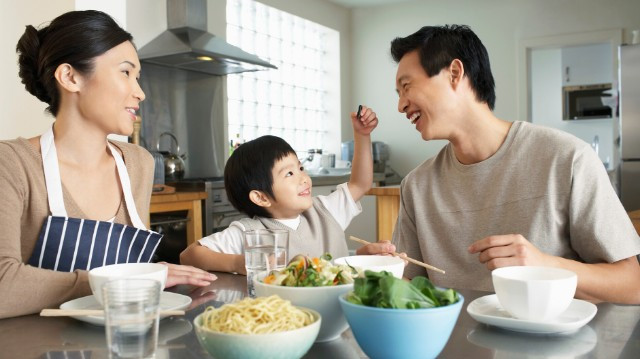In Japanese culture, the father figure is an important one. Not just for his role within his own family, but also the status that he has within the broader society. So, how do you say dad in Japanese?
Well like most Japanese words, there isn’t just one answer. Nope, that would be too easy!
So instead I’m going to share about eight different ways to say dad in Japanese! But don’t freak out (yet) because some of them are only slight variations of the same word. Let’s see them now.
The Informal Way To Say Dad
The Japanese word for dad is 父 (chichi). However, this word is a part of the “humble” Japanese language which means that you use it to lower your own status. This is an indirect way of raising the other person’s status (the listener) and showing them respect.
Since you’re not talking about yourself in this case, you’re lowering the status of your father (therefore your own family) when speaking to people who are outside of your family.
In other words, this word would be used when talking to other people about your own dad. You would never want to use it with someone else’s dad because to lower their status like that would be disrespectful.
You also wouldn’t want to use it towards your father, since children are supposed to show their parents respect and there are better words that can be used when speaking with him.
What you need to do when talking to your own dad, or about someone else’s dad, is to use the more respectful version in this next section.
Respectful Ways
In order to be more respectful and polite when talking about dads, you add on the both the polite お (o) prefex and also the respectful さん (san) suffix.
The end result is the word お父さん (otou san) which you will notice has a different pronunciation than the first word that we went over.
The 父 part has changed from ちち (chichi) to とう (tou).
The word お父さん is by far the most common word used for dad in Japanese.
The interesting thing is that even though you can technically use 父 when talking about your own dad to other people, it is actually more common for Japanese people to use お父さん since the society is one that emphasizes respect towards people who are older than you.
On the other hand, when Japanese kids talk directly to their dad, they generally use a form that is somewhere in between these two extremes and either drop the polite お to just say 父さん (tou san) when speaking to their fathers, or if they are really young, they might use the endearing 父ちゃん (tou chan) which swaps out the ending name suffix.
If you’re ever not sure what to use, then it’s perfectly fine to just stick with the お父さん version for all purposes.
Additional Ways

We’ve covered the most common, and probably most important words for dad when speaking Japanese, but there are still others that you might run into when reading or listening to native materials.
I figured that I would cover them here so that you can become familiar with them in case you encounter them sometime in the future.
The first word is 親父 (oyaji) and it’s similar to calling your dad “pops” when speaking to him or about him. Obviously, this is not as respectful as the earlier word, but I hear it a lot when watching anime so it’s definitely worth learning.
What’s interesting is that this word is created by combining the kanji for parent 親 (oya) with the kanji for dad 父.
Here’s where things get even more interesting: we can flip these two kanji and get yet another word for father!
This time the word is 父親 (chichi oya) which just translates as “father” in English and is a little more respectful than the first word we went over in this section.
What’s also interesting to note is that the reading for 父 changed from じ (ji) in the first word to ちち in this second one, even thought the other kanji’s reading remained constant.
Kanji like these, where there are two words and the other difference is that the kanji are flipped, are the ones that I mess up the most often. Sometimes I glance over what I’m reading and mistake one word for another.
For example, 日本 (nihon) for Japan and 本日 (honjitsu) for today trip me up unless I’m paying close attention.
Thankfully both 親父 and 父親 mean the same thing! Dear old dad!
Special Words
There are two final words that I wanted to go over for your old man, and they are both on opposite sides of the spectrum when it comes to their usage.
The first one is パパ (papa) which is just a loan word taken directly from English and means “papa.”
As I’m sure you’ve guessed, this word is generally only used by young Japanese children. Kids that are around the five-year-old mark or so.
This word is incredibly “familiar” in the sense that you would only ever use it with your own dad and never someone else’s.
The other Japanese word that I wanted to share is 父上 (chichi ue). This word, like many others in today’s lesson, means father in Japanese, but there are a couple of things to note about it.
The first is that it really only gets used in samurai films and anime where someone’s father has a very high social position, such as a king or the lord of a province.
The other thing is that this word falls into the “polite” category, but isn’t really a word that gets used in today’s Japan. If you do run into this one, it will probably be while watching a show.
All About Dads
Now you know all about dads in Japanese. Well, you at least know the words about them.
To be honest, I was quite shocked every time I would learn a new word for father in Japanese since we only have a few of them in English.
I guess it’s just one of those cultural differences where one language has a few words for something, and the other one actually has a lot.
Have you heard any other words for dad? Let me know by leaving a comment down below!
Further Resources for Learning Japanese:
#3 Get My eBook (Secrets to Learning Japanese) for Free

またね!

This was a great explanation. Thank you so much.
My pleasure!